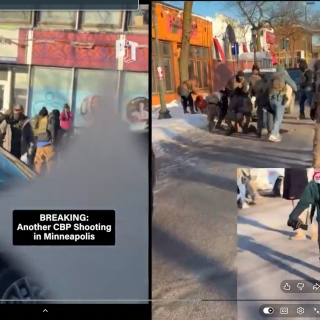The Columbus Civilian Police Review Board (CPRB) met on November 3, 2022, for the 15th time, admitting they are confused about key aspects of their power to discipline sworn officers of the Columbus Division of Police (CPD).
Willard McIntosh, the only member of the board previously sworn to serve as a Columbus police officer, summed up their concerns well:
“My family, my friends, say, ‘What can you guys do?’
And when I explain it, to be honest, they say, ‘Oh so, nothin’?’
Really.”
Janet Jackson, the chair of the board, had invited several Assistant City Attorneys to the meeting to help the board prepare to review the first thirty investigations completed by Inspector General Jacqueline Hendricks, in attendance.
Jackson began the meeting by thanking City Attorney Zach Klein, who was sitting at the table with the board members, and his staff for doing a wonderful job responding to the needs of the CPRB, acknowledging that she is not his only client and that his office is very busy.
One of the many duties that keep Klein’s office busy is defending the city in the civil lawsuits brought by victims (or the families of deceased victims) who allege misconduct by CPD officers. It could be difficult to understand how Klein can give advice to both the Inspector General, who investigates the misconduct reported by citizens, and also to the city that is being sued by the same citizens.
Adrienne Hood v City of Columbus
Another interesting connection was revealed by Assistant City Attorney Robert Tobias as he began his presentation. He shared that he was initially hired by Jackson when she was the City Attorney in 1996. He went on to explain he knew nothing about the CPRB until he invited Hendricks and a board member to speak to his law class at Capital University.
Attorney Jeff Furbee, who also reports to Klein, is permanently assigned to advise the police department. He is identified as an expert trainer on its website.
In response to increasing frustration being expressed by board members, Furbee responded, “I don’t do philosophy. I do law. The bottom line is you guys make recommendations to the Division of Police and the Department of Public Safety. I would like to think they’ll follow them but they don’t have to.”
The CPRB is like a blushing bride who unknowingly married into a big happy family ready to defend the previous actions the city, its police department, and its union have taken. As members of the CPRB began to realize the constraints put on their power, Furbee explained, “We are constrained by the collective bargaining agreement, no doubt. We agreed to that as a city.”
Police accountability activist Paisha Thomas said, “This tells us a lot about how the board is being advised to maintain the status quo of one of the most violent police departments in the country. Janet Jackson has a decades-long history of fighting to protect Columbus police from being held accountable. Her actions have helped to perpetuate state-sanctioned violence. It isn’t surprising she has invited her friends from the city attorney’s office to help her control the actions of this board which is clearly not in the control of the citizens.”
When vice-chair Brooke Burns asked where she might find data on the use of force by officers, she was told that it exists somewhere within CPD.
“CPD is a big agency and a lot happens…in the last year they have probably had three to four thousand displays of firearms,” Furbee said, asking not to be quoted because he may be wrong.
Tobias reminded the panel that if they do find a use of force on their own they would then need to hold a meeting and call for a vote to take action.
Furbee added, “And I would just caution–I’m not trying to talk you out of anything–but the Division of Police, like I said, has a lot of uses of force, the vast majority of which the citizen doesn’t complain about in any manner and I would say most of the time they don’t complain because they don’t think it unjust.”
One suggestion to limit the number of cases they would see from a data request came from Furbee when he mentioned that they could look at all the cases referred to the State of Ohio Bureau of Criminal Investigation (BCI). This sparked another moment of clarity when the dismayed Board Member Gambit Aragon suggested that they should serve longer terms.
After the killing of Donovan Lewis by Columbus police officer Ricky Anderson in August, the board directed the Inspector General (IG) to open an investigation. It is becoming clear to the board that they may never see that investigation delivered to them before their two or three-year terms expire.
Aaron Thomas, one of the most outspoken members of the board who never failed to ask relevant questions that were often disregarded, resigned after the Lewis killing. His unexplained exit may have foreshadowed the frustration displayed at this month’s meeting.
The IG is prevented from engaging in key activities required to complete her own investigation while the BCI investigation is open. That investigation is considered open until a grand jury declines to indict the officer or a trial is completed. Jackson told the board that the Franklin County Prosecutor is currently handling 240 murder cases and those currently being tried are from 2018 or 2019.
So, it could be up to four years before the board can consider any action on the Lewis case.
That is much longer than Paisha Thomas can wait for action. She would like to see the FBI investigate CPD and enter into a consent decree with the city for the change that is necessary.
Jackson divided up the board into three review committees which will each be reviewing approximately ten completed investigations before the December meeting, when the honeymoon might be over.
Watch the complete 2.5 hour meeting here



